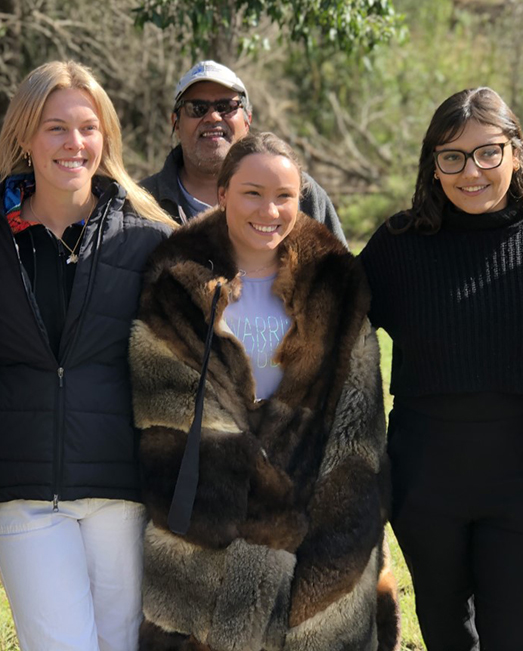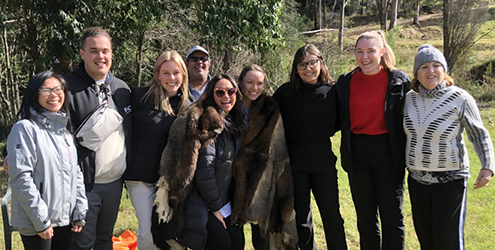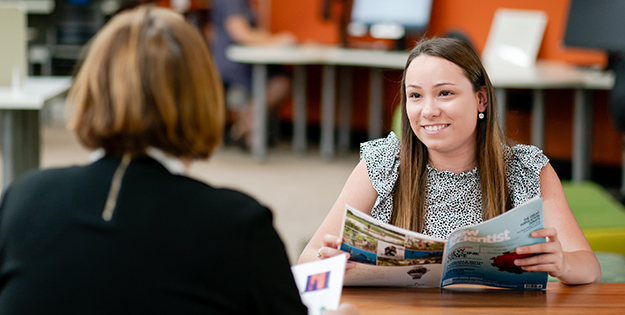Community
Copyright@ Australian Catholic University 1998-2026 | ABN 15 050 192 660 CRICOS registered provider: 00004G | PRV12008
Copyright@ Australian Catholic University 1998-2026 | ABN 15 050 192 660 CRICOS registered provider: 00004G | PRV12008

Growing up as an Aboriginal kid in Sydney, Georgia Durmush was lucky enough to be surrounded by good mentors. They were there at Gawura school, where she studied alongside her sister Rachel, and in her community, too: teachers, elders and family members who encouraged her to pursue her interests and take her own path.
“Having teachers and mentors who believed in me really shaped my journey,” says Georgia, a Wailwan and Gomeroi woman who completed her Doctorate of Philosophy at ACU in late 2021.
“My mother was always telling us about the importance of education, and at school, our mentors had high expectations – they didn’t see Indigenous people, culture and history through a deficit lens, and that was really empowering.”
These positive experiences continued at university, where she connected with Indigenous peers and support staff, allowing her to feel a sense of belonging.
“You had a whole mob there who supported you and provided a sense of community and family, which is really important for Indigenous students,” says Dr Durmush, whose research has investigated how Indigenous university students conceptualise wellbeing.
She acknowledges, however, that for many Aboriginal and Torres Strait Islander students, the university journey is a rough ride.
In Australia, less than half of Indigenous students who enrol in higher education go on to complete their degree, a rate much lower than non-Indigenous students.
While there are multiple barriers to university completion, Dr Durmush prefers to emphasise the drivers of student success. Her research has shown that with adequate support mechanisms, the creation of culturally-safe spaces, and the opportunity to forge meaningful relationships with peers and role models, many more First Nations students would prosper.
“For so many Aboriginal kids, there’s been that lingering perception where they question themselves – ‘Am I smart enough? Can I do it?’ – and in many cases, that’s because when they go to university, they rarely see Indigenous lecturers and senior Indigenous academics in decision-making positions,” she says.
It was only in the late 1960s that the very first generation of Aboriginal people were able to access to higher education – more than a century after the first Australian universities were founded.
“Up until then, we were denied that right, and it’s only really recently that we’re starting to see universities wanting to centre Indigenous knowledges, bringing elders into these spaces and community members who have so much knowledge to share, and that helps to make higher education a place of belonging for our people, giving them space to become our future leaders.”
With its focus on Indigenous thriving and improving learning outcomes, ACU’s Institute for Positive Psychology and Education (IPPE) established Game Changers, a multi-faceted research program that aims to positively impact the lives of Indigenous youth, families and communities.
As part of the program, the Institute appointed a panel of five Indigenous students from various faculties of ACU to serve as interns and participate in research activities.

Georgia and interns visiting the Wonnarua National Aboriginal Corporation.
Known as the ‘Champions’, the interns are led by Dr Durmush, who is now a research fellow with the Institute, and mentored by its director, Professor Rhonda Craven, a respected education academic with close familial ties to the Wonnarua nation.
The internship program serves dual purposes: It will result in the publication of a wide-scale systematic review of international studies on Indigenous education, further identifying the drivers and barriers to student success; and at the same time, it has given the interns an opportunity to be mentored by established Indigenous researchers, while kickstarting their own careers.
“It’s not just about developing their research skills, it’s also about building their confidence and allowing them to establish cultural, academic and social support networks with Indigenous peers and academic staff,” says Dr Durmush, who stresses the importance of research that engages with young Indigenous voices.
“It’s been such a great success, to see young Indigenous people analysing and interpreting research findings, having a voice and an opportunity to share their knowledges and provide their unique perspectives on research that impacts them.”
One of the five participants, Walbunja Yuin woman Emily Jeffrey, says the process of engaging in research of importance to First Nations people has been incredibly rewarding.
“Being part of this research allows me to contribute in a way that feels bigger than me,” she says. “It gives me an opportunity to bring my own cultural knowledge and perspective, which I believe is imperative to First Nations sovereignty and self-determination.”
Tharawal woman Hayley Creed says that being involved with Game Changers program has given her the confidence to embrace her heritage.
“Coming into university, I had never felt comfortable opening up about my Indigenous background,” she says.
“Joining the internship enabled me to be surrounded by mob who are extremely passionate about making a change within culture, and that has been a driver to my university success. These mob have taught me to be proud being Aboriginal.”
Another intern, Kamilaroi man Lachlan Sibir, says he enjoyed seeing how the research would have a wider impact.
“It is hard to describe,” he says, “however, I do get a feeling of joy and accomplishment when researching Indigenous people and communities, as I am exposed to a bigger picture.”
With the help of the Champions intern panel, Dr Durmush expects to publish her research findings by early 2023, adding to the knowledge base on the drivers of higher education success in Indigenous populations across the English-speaking world.
In the meantime, a team led by Professor Rhonda Craven has been busy working on a range of projects in partnership with the Wonnarua Nation Aboriginal Corporation, based in the Hunter region of NSW.

The Game Changer projects focus on strengthening Indigenous identity, improving school attendance, and supporting successful transitions to employment and higher education.
“Research shows that completing a university education is so powerful that it completely closes the employment gap between Indigenous and non-Indigenous people,” says Professor Craven, who has published widely on Indigenous educational outcomes.
She points out that 92 per cent of First Nations university graduates are engaged in full-time employment within four months of course completion, compared to 87 per cent of non-Indigenous graduates, and they earn more on average.
“University education is a game changer not only for Indigenous individuals,” she says, “but also for entire communities and for Australia as a whole.”
A greater Indigenous presence in universities would also be beneficial to all Australians, Dr Durmush adds, in that it enables a closer connection to Aboriginal and Torres Strait Islander culture and history.
“If you are Australian, if you call this your home, this is your culture to learn, too,” she says, “We have a shared history and a very deep knowledge base to draw from.”
Her next research project will look at the effects that learning First Nations languages has on primary-school children of both Indigenous and non-Indigenous backgrounds.
At Gawura, where Georgia went to primary school, students learn Wiradjuri language and have lessons each week with a specialised teacher who lives on country.
Dr Durmush says that learning and working in an environment that values First Nations cultures and knowledges has been an important element in her academic success. She is thankful for her mentors from her school days through to her current role, including the guidance and support she has received from Professor Rhonda Craven, who she labels “a powerhouse”.
“As a young Aboriginal researcher, it’s just been invaluable to have that level of support from mentors who are so accomplished, and also so passionate about seeing Indigenous people thrive and flourish,” says Dr Durmush, who hopes, in turn, to act as a mentor for emerging Indigenous researchers.
“Having someone who understands culture and community and knows where you’re coming from, who believes in your and values your contributions, it’s just so important not only for Indigenous people, but for all people.
“In the end, it’s about everybody thriving because it’s a two-way relationship of giving and sharing, so we can forge that connection and have that respect for one another. To see that happen with my own two eyes, it makes me feel very positive and very hopeful for the future.”
Keen to learn more about ACU? Explore the options.
Copyright@ Australian Catholic University 1998-2026 | ABN 15 050 192 660 CRICOS registered provider: 00004G | PRV12008